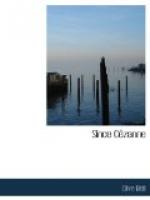In that delightful book The Worlds and I, for bringing me acquainted with which I shall ever be grateful to The Athenaeum, nothing is more delightful than the chapter in which Mrs. Wilcox takes us through the list of the great writers she has known. We are almost as much pleased by the authoress’s confident expectation that we shall be thrilled to learn any new fact about Miss Aldrich, who wrote “one of the most exquisite lyrics in the language”; about Rhoda Hero Dunn, “a genius” with “an almost Shakespearean quality in her verse,” or about Elsa Barker, whose poem The Frozen Grail, “dedicated to Peary and his band, is an epic of august beauty,” and whose sonnet When I am Dead “ranks with the great sonnets of the world,” as she would be surprised to discover that we had never heard of one of them. Mrs. Wilcox believed, in perfect good faith, that the crowd of magazine-makers with whom she associated were, in fact, the great figures of the age. She had no reason for supposing that we should not be as much interested in first-hand personal gossip about Zona Gale and Ridgeley Torrence, Arthur Grissom (first editor of the Smart Set), Judge Malone, Theodosia Garrison, and Julie Opp Faversham ("even to talk with whom over the telephone gives me a sense of larger horizons”) as we should have been in similar gossip about Swinburne and Hardy, Henry James and Mallarme, Laforgue, Anatole France, Tolstoy, Tchekov, or Dostoevsky.
And, as Mrs. Wilcox had no reason for supposing that her friends were not the greatest writers alive, what reason had she for supposing that they were not the greatest that ever lived? Without the taste, the intelligence, or the knowledge which alone can give some notion of what’s what in art, she was obliged to rely on more accessible criteria. The circulation of her own works, for instance, must have compared favourably with that of most poets. To be sure there was Shakespeare and the celebrated Hugo—or was it Gambetta? But what grounds could there be for thinking that she was not superior to the obscure John Donne or the obscurer Andrew Marvel, or to Arthur Rimbaud, of whom no one she had ever heard of had ever heard? Mrs. Wilcox was not dishonest in assuming that the most successful writer in her set was the best in the world; she was not conceited even; she was merely ridiculous.
It is disquieting to find the same sort of thing going on in England, where our painters are fiercely disputing with each other the crown of European painting, and our critics appraising the respective claims of Mr. Augustus John and Mr. John Nash as solemnly as if they were comparing Cezanne with Renoir. It is more than disquieting, it is alarming, to detect symptoms of the disease—this distressing disease of Wilcoxism—in The Athenaeum itself. Yet I am positive that not long since I read in this very paper that Mr. Wyndham Lewis was more than a match for Matisse and Derain; and, having said so much, the critic not unnaturally went on to suggest that he was a match for Lionardo da Vinci. Since then I have trembled weekly lest the infection should have spread to our literary parts. Will it be asserted, one of these Fridays, that the appetizing novels of Mr. Gilbert Cannan are distinctly better than Hardy’s Wessex tales, and comparable rather with the works of Jane Austen?




